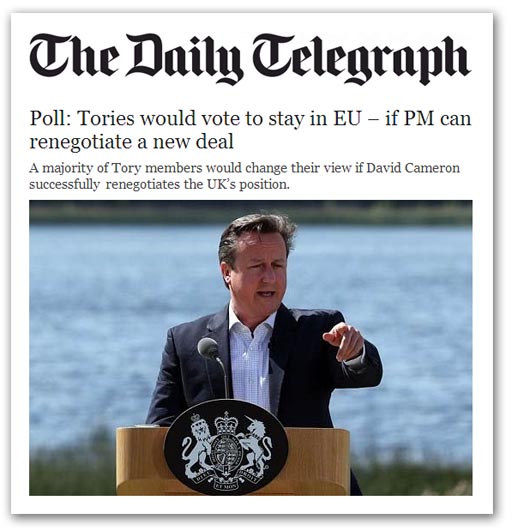20/06/2013
As a working definition of the term "eurosceptic", I prefer it to mean someone who wants to leave the European Union â and is not prepared to compromise. Perhaps we have to move on: use the word "outer" and leave it at that.
However, according to the Telegraph Media Group's
finest, 54 percent of Tory grassroot members do not meet the most rigorous definition of "eurosceptic".
This comes from a recent
YouGov poll carried out for Queen Mary, University of London, and the University of Sussex, which starts well enough. It tells us that 71 percent of Tories would vote to leave the EU if a referendum was held now, with only 20 percent wanting to stay in.
But, if Mr Cameron achieves "a deal with the EU that protects Britain's interests" â whatever that might be â a multitude of rats desert the eurosceptic ship and 54 percent of Tories end up wanting to stay in the EU. Just 38 percent say they want to leave.
Tim Bale for the
Telegraph thinks that these Tories are eurosceptics, but "they trust David Cameron's strategy on the European Union".
Actually, it isn't a strategy, as such, unless you take fooling the gullible as one. And before you draw any particular conclusions, you have to look at earlier results. As we
saw earlier, the survey
in July 2012 had 48 percent wanting to pull out and 31 percent wanting to stay in the EU, across the political divide.
However, if a new deal was renegotiated, the poll suggested that people would vote in a completely different way. Most â 42 percent - would vote to stay in the EU and only 34 percent wanted to leave. And, with Tories, the percentages are very similar to what they are now, with 55 percent wanting to stay in, versus 34 percent wanting to stay in.
Where there is a difference is in the number of Tories wanting to leave without there being negotiations. In July last year, 58 percent would have left, so the current 71 percent represents a significant hardening of sentiment.
Nevertheless, the crunch figure is almost unchanged: 55 percent of Tories would buy renegotiation last year, and 54 percent buy it now. What we are seeing, therefore, is very much what we have seen before â an ossifying of sentiment with very little change over time, despite the more intense narrative and the rise of UKIP.
For me, that is the important thing. People's views have hardened and they are not being influenced by the debate. Thus, how they will behave if we get a referendum, much less a negotiation, is hard to judge. But there's no great cause for optimism.
COMMENT THREAD

